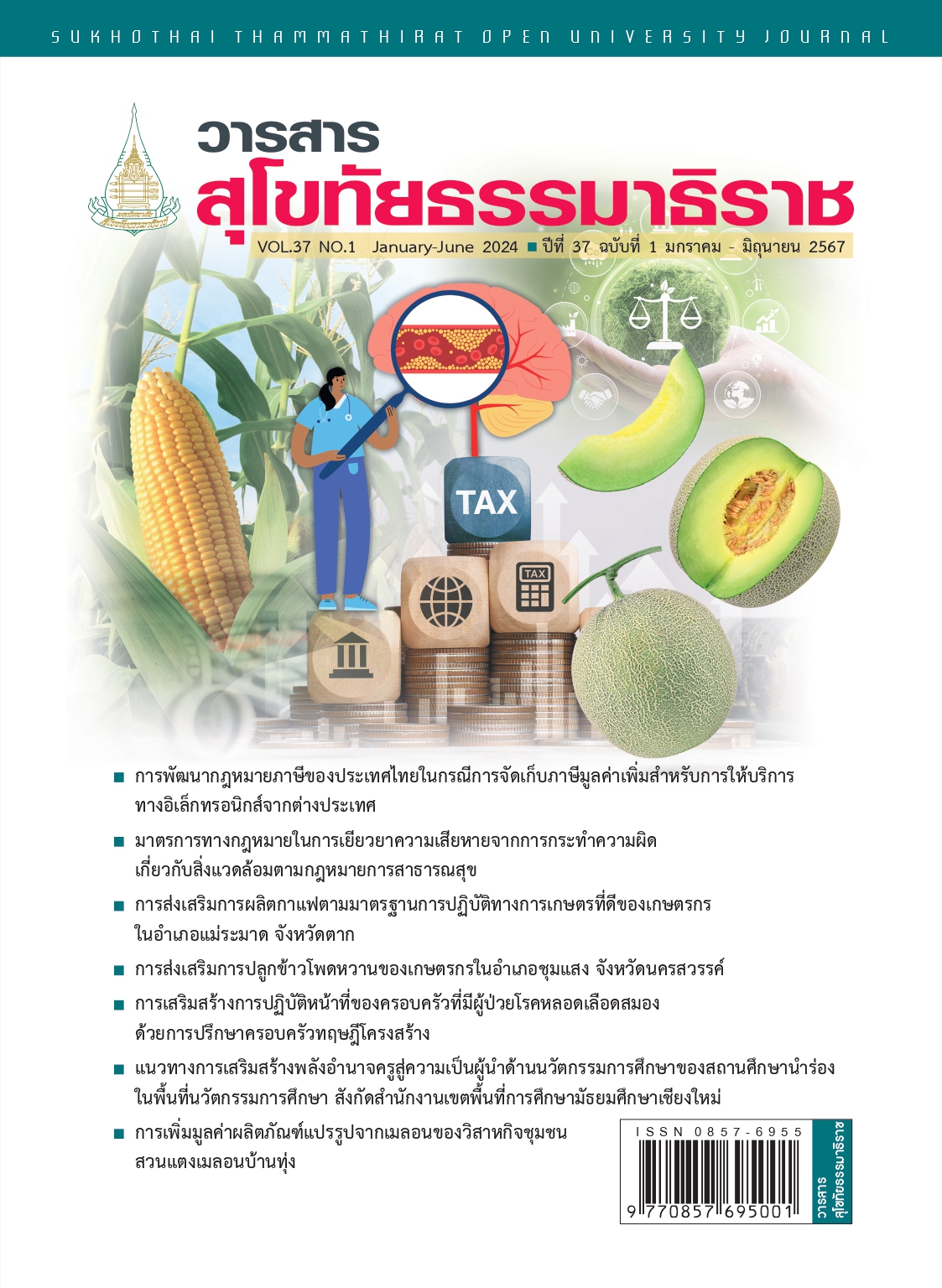The Development of Thailand Tax Law Regarding the Value-Added Tax Collection on Foreign E-Services
Keywords:
Value-Added Tax, Foreign E-Services, Electronic PlatformAbstract
The objectives of this research were; (1) to study the guidelines relating value added tax (VAT) collection on foreign e-services; (2) to study guidelines relating VAT collection on foreign e-services under the foreign legal regimes and international legal standards; (3) to study guidelines relating VAT collection on foreign e-services under Thai legal regime; (4) to comparatively analyze legal principles and problems relating VAT collection on foreign e-services under foreign legal regimes and international legal standards; and (5) to propose an effective guideline for improving VAT collection on foreign e-service well- suited for Thailand. This research was a qualitative research conducted based on the documentary research and in-depth interview.
The results showed that (1) VAT collection on foreign e-services should conform to the good tax collection principle; (2) OECD issued a guideline relating VAT collection on foreign e-services by requiring member countries to equip with the place of taxation principles, which the places for e-services were in consideration. Also, rules relating VAT registration and simple guidelines on other relating practices needed to be initiated to support foreign e-service providers. In fact, Australia and Republic of Singapore have issued a VAT collection on foreign e-service guideline conforming with that of OECD; (3) VAT collection on this issue in Thailand conformed to the OECD guideline, which VAT collection from the place where e-service was operated was Thailand. Furthermore, a system on VAT for Electronic Service (VES) was established to support foreign e-service providers; (4) by comparing principles under Thailand, OECD, Australia and Republic of Singapore, Thailand faced problems in addressing a definition which was ambiguous causing problems in construe, criterion for VAT registration, and the measures for non-VAT registrants; and (5) this research proposed a guideline for Thailand to make an amendment on the definition to be clearer and more extensive. A medium was recommended to be created to develop an understanding amongst foreign e-service providers according VAT collection principles. Legal measures for non-VAT registrants were suggested to be added for creating an effective VAT collection on this issue.
References
AUSTRALIAN TAXATION OFFICE. (2017). Registration. Retrieved June 16, 2021, from Australian Taxation Office Web site: https://www.ato.gov.au/business/international-tax-for-business/gst-on-imported-services-and-digital-products/registration/
AUSTRALIAN TAXATION OFFICE. (2020). GST on imported services and digital products. Retrieved June 16, 2021, from Australian Taxation Office Web site: https://www.ato.gov.au/Business/International-tax-for-business/GST-on-imported-services-and-digital-products/
AUSTRALIAN TAXATION OFFICE. (2021). Registration. Retrieved July 12, 2022, from Australian Taxation Office Web site: https://www.ato.gov.au/ Business/International-tax-for-business/GST-on-imported-goods-and-services/Our-compliance-approach/
INLAND REVENUE AUTHORITY OF SINGAPORE. (2023). IRAS e-Tax Guide GST: Taxing imported remote services by way of the overseas vendor registration regime. (2nd ed.). Singapore: Inland Revenue Authority of Singapore.
OECD. (2015). Addressing the Tax Challenges of the Digital Economy ACTION 1: 2015 Final Report, OECD/G20 Base Erosion and Profit Shifting Project. Paris: OECD Publishing.
OECD. (2017). International VAT/GST Guidelines. Paris: OECD Publishing.
The Revenue Department. (2021). A Guide on VAT on Electronic Service Provided to Non-VAT Registrants in Thailand by Non-resident Business Person. (1st ed.). Bangkok: The Revenue Department.
The Revenue Department. (2022). A Guide on VAT on Electronic Service Provided to Non-VAT Registrants in Thailand by Non-resident Business Person, (2nd ed.). Bangkok: The Revenue Department.
Downloads
Published
Versions
- 2024-09-17 (2)
- 2024-09-17 (1)
How to Cite
Issue
Section
License
Copyright (c) 2024 Sukhothai Thammathirat Open University

This work is licensed under a Creative Commons Attribution-NonCommercial-NoDerivatives 4.0 International License.
บทความที่ได้รับการตีพิมพ์เป็นลิขสิทธิ์ของวารสารมหาวิทยาลัยสุโขทัยธรรมาธิราช
ข้อความที่ปรากฏในบทความแต่ละเรื่องในวารสารวิชาการเล่มนี้เป็นความคิดเห็นส่วนตัวของผู้เขียนแต่ละท่านไม่เกี่ยวข้องกับมหาวิทยาลัยสุโขทัยธรรมาธิราช และคณาจารย์ท่านอื่นๆในมหาวิทยาลัยฯ แต่อย่างใด ความรับผิดชอบองค์ประกอบทั้งหมดของบทความแต่ละเรื่องเป็นของผู้เขียนแต่ละท่าน หากมีความผิดพลาดใดๆ ผู้เขียนแต่ละท่านจะรับผิดชอบบทความของตนเองแต่ผู้เดียว
ห้ามนำข้อความทั้งหมด หรือบางส่วนไปพิมพ์ซ้ำ เว้นแต่จะได้รับอนุญาตจากกองบรรณาธิการวารสาร


